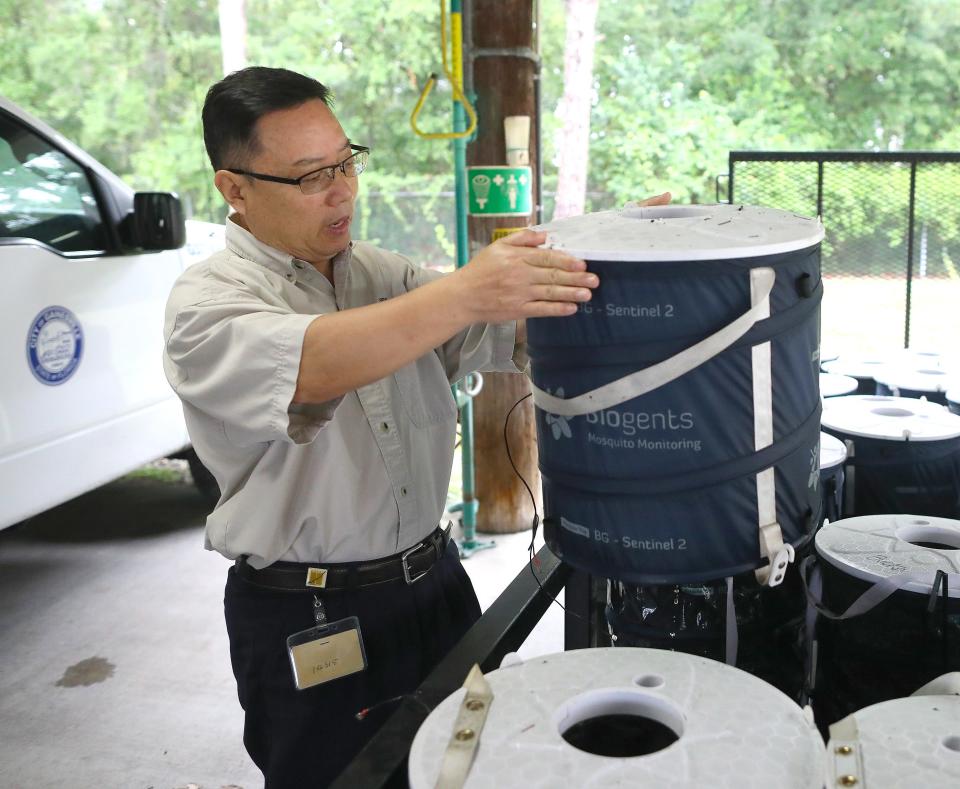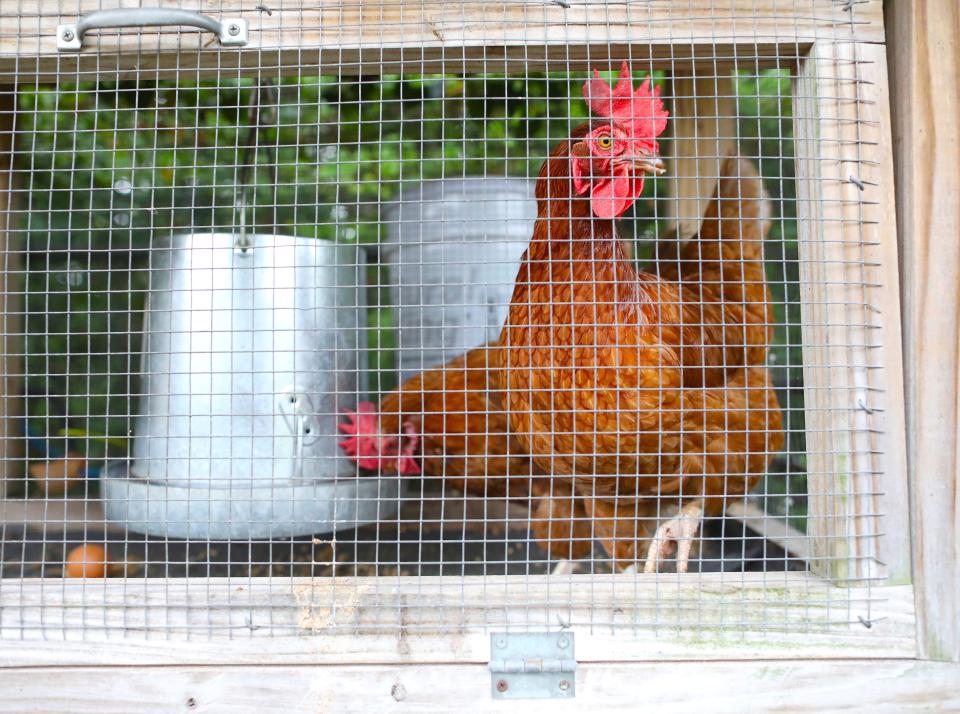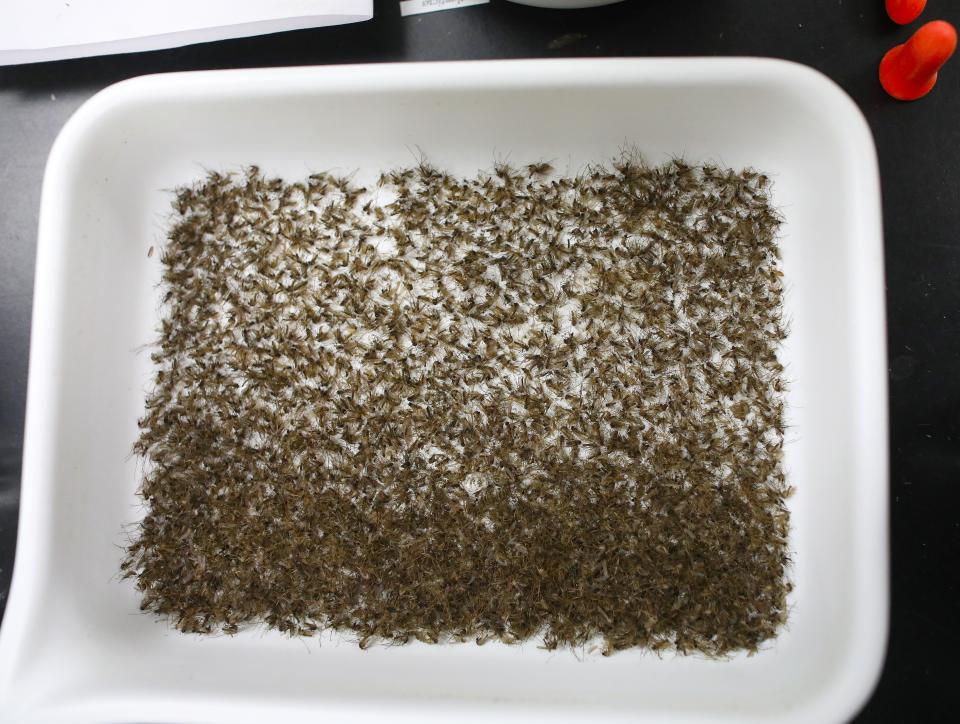Chickens, fish, plants. How Gainesville's mosquito unit fights off blood-thirsty creatures
Tucked away behind Gainesville's public works building along Northwest 39th Avenue are a research lab and a host of creatures dedicated to combating flying, blood-sucking pests people prefer to avoid.
Chickens, fish and plants are just some of the resources used to control Gainesville's mosquito problem.
While many cities around the state do more to control mosquitos than most may realize, Gainesville offers a unique approach where spraying pesticides is seen as a dated tool.
Dr. Peter Jiang, an entomologist and director of the city’s mosquito control division, says only 10% of what his team does involves spraying insecticides. The other 90% involves taking proactive measures — working to limit the number of mosquito larvae developing into adulthood in the first place.
“The first thing we start with is surveillance, where we set up (mosquito) traps in the field that we bring back to the lab,” Jiang said. “Then we identify the mosquitos, which is a key thing for us. What mosquito species are in the area and what’s the population? Once you know the species, you know the history and where they breed.”
Alford files for office: Former Alachua County Commissioner Mary Alford files to run for office after resigning
Going away: Driver charged in fatal hit-and-run of UF student Maggie Paxton sentenced to 6 years
Now hiring: Alachua County school district to host job fairs to fill roles at elementary schools
Besides using big trucks to spray pesticides around town, the city of Gainesville’s mosquito control division uses advanced technology with a focused approach that aims to limit the number of mosquitos that mature to adulthood.
Using a geo-coded map divided into 16 zones, Jiang and his team can identify and treat mosquito breeding locations around the city.
It's a tough job, but somebody's got to do it.

“We check all the breeding sites and treat them at least once a month,” he said. “In the summertime, it may be more. In the wintertime, it may be less.”
There 80 different mosquito species in Florida and 43 in Alachua County.
Mosquito larvae tend to hatch when it rains, which is why they increase in population during the summer. The rainy season in Florida usually lasts from June through September, resulting in scores of tiny vampires hungry to feast around the region.
The division uses an arsenal of weapons that includes traps, chickens, fish and pollination gardens.

Chickens are used to monitor the types of viruses mosquitos can potentially spread in the area by testing blood samples weekly. There are six chicken coups positioned around the county exclusively for this purpose. Unlike humans, chickens can live with a mosquito-borne virus without experiencing any adverse health effects.
At least 10 of the 43 mosquito species in the county are capable of carrying viruses.
Mosquitofish, a non-invasive species in Alachua County, also help to limit the amount of mosquitos by eating mosquito larvae that hatch in water. Jiang has several pools outside his lab where he farms this type of fish. Ultimately, the fish and eggs are dropped strategically in various bodies of water around the city.
Residents living within the city limit can call the division and ask that mosquitofish be planted in bodies of water near their homes to help control an influx of mosquitos if needed.
Surprisingly, not all mosquitos bite. And while most come out at night — two to three hours after sunset is peak activity — some are active during the day.
Most mosquitos come out at night because that’s when other animals tend to come out, providing greater opportunities to feed, research shows. When humans get attacked by a mosquito, it's not because we necessarily taste better. We're just another animal to feed on.
Mosquitos are attracted by carbon dioxide or heat, which makes humans easy targets.

Ever wonder why some people attract more mosquitos than others?
Jiang says it has to do with the composition of chemicals in our skin, that make some more attractive to mosquitos than others, which is why repellents like "OFF!" are applied directly to the skin.
How to keep them away
To help eliminate mosquitos around their home, residents should dump anything containing water for an extended period. Something as small as a bottle cap full of water can lead to the birth of 10 to 20 mosquitos.
Households can also participate in a research study that involves placing a special mosquito trap in their backyards.
In partnership with the University of Florida, Jiang and his team use In2Care mosquito traps, which attract egg-laying backyard mosquitos by using environmentally-friendly bioactives, to contaminate mosquitos with a fungus. Once the mosquito acquires the fungus from the trap, it is eventually killed along with its eggs at breeding sites that are hard to find.
If interested in participating in the study or for more information, contact Dr. Peter Jiang at JiangY1@cityofgainesville.org, Dr. Estelle Martin at estellemartin@ufl.edu, or Decyo McDuffie at mcduffie@decyo.ufl.edu.
This article originally appeared on The Gainesville Sun: Gainesville mosquito control works to limit insects during summer months

